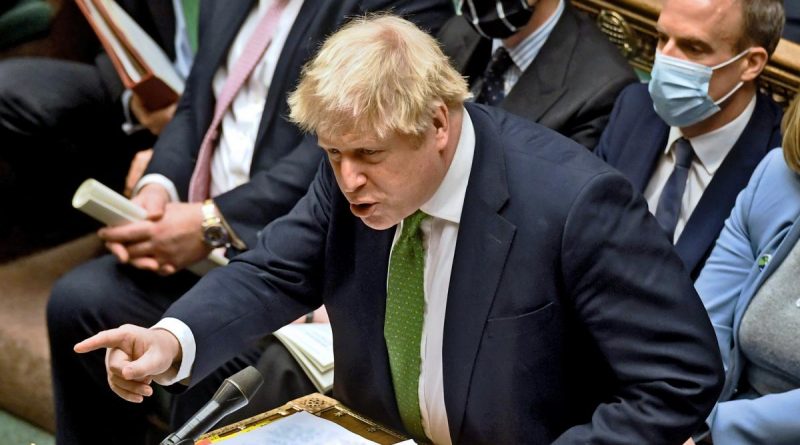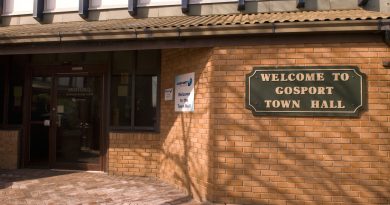Battling PM announces Covid easements
By Connor Steel
BORIS JOHNSON has announced that England will move away from Plan B Covid-19 restrictions by the end of January, relaxing six weeks of curbs enforced in response to the Omicron variant in late 2021 including work from home guidance, vaccine passports and the wearing of face coverings.
In a statement to the House of Commons on Wednesday afternoon the Prime Minister announced the move back to Plan A, which he said was down to the success of the booster rollout and steps of the English people since he introduced the restrictions back on December 8 after scientific concern.
But advisors now believe that cases have peaked nationally with Office for National Statistics (ONS) data showing infection levels have fallen for the first time since late November, with all information presented to the Cabinet on Wednesday morning before being finalised and then presented to MPS.
Mr Johnson confirmed that the Government would immediately drop their work from home advice from Thursday (January 20), with all employers asked to have discussions with their staff as soon as possible about returning to the office and individual circumstances can be considered in timetables.
Moving onto face coverings the PM said masks will no longer be mandated in public spaces after January 27; but issued advice that they be worn in crowded areas such as supermarkets and transport. The need for coverings in classrooms was further removed immediately from Thursday.
Citing it was time to “trust the judgement” of the public, Mr Johnson also announced the ending of Covid-19 passports needed to enter nightclubs and large events. Further updates on easing of travel rules and care home restrictions will be released in the coming days with all guidance to be changed.
Although the legal requirement to self-isolate for five days remain in place when testing positive for Covid-19, the PM stated his ambitions to remove this restriction on March 24 in a move designed to treat “Covid like the flu”. But in his statement Mr Johnson did say that he would bring this forward if the data continued to show positive progress against the virus.
But the Prime Minister struck a cautious note to this optimistic statement urging people to “remain cautious” and the pandemic “wasn’t over”. He referenced pressures on certain NHS trusts and also warned that viruses mutate; particularly during the last few weeks of winter after months of work.
Labour leader Sir Keir Starmer said he would back lifting Plan B measures “as long as the science says it is safe” and accused the prime minister of being “too distracted” to have a “robust plan to live well with Covid”. A vote is likely to be held next week in the Commons.
It is important to stress that these easements are for England only, with the devolved administrations each making announcements this week. So far Scotland have announced that their social distancing measures will no longer be needed in certain sectors, whilst Wales’ First Minister has outlined his plan for a timetable of easing measures, finishing in early February and includes a change in alert level.
This announcement comes as part of a scheduled review into restrictions, but critics will say that this is another distraction away from the ‘partygate’ scandal engulfing the Conservative party and Westminster; more developments this week ramping up pressure on Mr Johnson to quit as PM.
On Monday Dominic Cummings wrote in a blog that he warned the PM that the May 2020 party at Downing Street risked breaking Covid rules at the time, a charge that Mr Johnson has denied and could be ‘misleading parliament’ pending results from the Sue Grey inquiry.
In response ex-Conservative MP Christian Wakefield deflected to Labour before the weekly session of Prime Minister’s Questions on Wednesday, whilst the leader faced further calls to resign including from his own party as David Davis MP told him to “in the name of God, go”
Conservative anger towards Mr Johnson is building as more MPs submitted letters outlining no-confidence in the PM’s leadership, with rumours that the threshold of 54 letters (15% of party MPs) could be reached in the next few day; although no official word will be announced until the 54 have been submitted.
This means that Boris Johnson could face an official vote of no confidence in his role as the Conservative party leader and Prime Minister, which could in turn trigger a leadership battle within the ranks with Chancellor Rishi Sunak or Cabinet Member Liz Truss the favourite to win any contest.
However if Mr Johnson wins any vote of no confidence, needing just 50.1% of MPs support to seal victory, he will be immune to any leadership challenges for twelve months. This was a scenario that occurred in December 2018 under Theresa May, although the Maidenhead MP resigned in June after failing to pass her Brexit proposals in Parliament.
PICTURED BY BBC NEWS: Mr Johnson battles forward with Covid-19 easements despite calls to quit as PM




